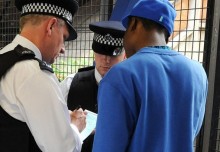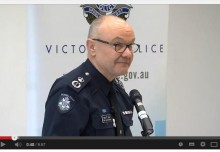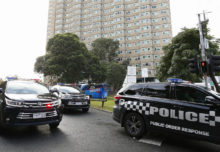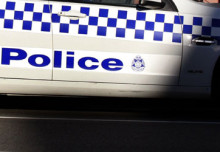Youth workers need to be able to recognise and respond to young people’s complaints about police treatment.
In the lead up to our Police Accountability Practice Forum coming up (15th November, bookings here.) we thought it would be useful to publish extracts of the More Things Change, The More They Stay The Same report we published in 2015.
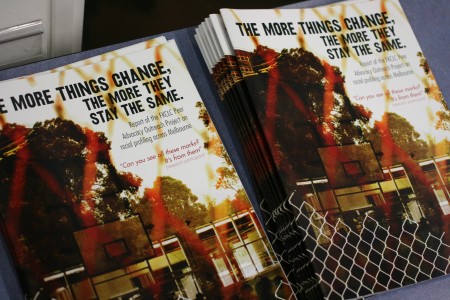 This unique outreach legal needs analysis report found that youth and community workers in general were ill-equipped to respond effectively to reports of police abuse from young people, had little knowledge of complaint options and how to effectively advocate for their young clients and often face role restrictions and confusion.
This unique outreach legal needs analysis report found that youth and community workers in general were ill-equipped to respond effectively to reports of police abuse from young people, had little knowledge of complaint options and how to effectively advocate for their young clients and often face role restrictions and confusion.
In short, young people routinely disclosed stories of racialised policing to the community workers they trusted. Almost universally, those workers were not equipped, mandated or skilled enough to do anything about those disclosures. Hence the need for sector wide resourcing and training for youth and legal workers.
The key findings of the report were:
- All workers we spoke to had young clients who reported or disclosed abuse or mistreatment by police;
- Workers demonstrated a concerning lack of awareness of the racial profiling experienced by their clients. There was a lack of understanding of the term and the impact it has not only on the client but the family and community as a whole;
- As a sector, racial profiling is not acknowledged as a community development issue and there is not much understanding of what the practice is along with its personal impacts or broader ramifications for society;
- Some community groups have recognised the symptoms of criminalisation and racial profiling such as mass incarceration. They have not been able to identify the issue as criminalisation of their community. They are currently still enquiring about what is leading to large numbers of their youth entering the criminal justice system;
- Further enquiry and research into how the youth and community development sector respond to racialised policing of their client groups is required. The anecdotal evidence is present but there hasn’t been a comprehensive research study conducted yet;
- Community Development workers urgently need training about racial profiling, police powers and the complaints process. This also means that the youth, community development and social welfare sector can assist the legal sector to achieve better legal outcomes for young people who are victimised.
If you work for or with a community agency working with young people, we encourage you to send staff, senior mangers, program coordinators to our upcoming Police Accountabilty Practice Forum.
The More Thing Change Report (Excerpts)
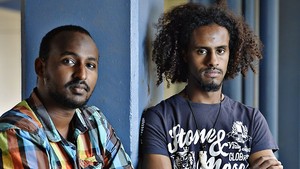 We are Daniel Haile Michael and Maki Issa (pictured). Ten years ago we started our fight against racial profiling. Our experiences of racial profiling do not define us, but our experiences at the hands of police have greatly impacted our lives. We are brothers, sons, community organisers, university students, actors, small business managers, advocates, and much more. We want to share our story and our experiences with others, especially young people who are right now facing racialised policing.
We are Daniel Haile Michael and Maki Issa (pictured). Ten years ago we started our fight against racial profiling. Our experiences of racial profiling do not define us, but our experiences at the hands of police have greatly impacted our lives. We are brothers, sons, community organisers, university students, actors, small business managers, advocates, and much more. We want to share our story and our experiences with others, especially young people who are right now facing racialised policing.
We have resisted and fought against racial profiling in a range of ways. We want other young people to know that they can too. To do this, young people need support from the broader community. In 2013 we were lead applicants in the Federal Court Race Discrimination case, which resulted in commitments by Victoria Police to change its practices and policing of diverse communities. We had both experienced racial abuse and profiling at the hands of police in Flemington since 2005. We were able to keep going with this case because we understood this was an opportunity to spark change. We had a vision of ending police brutality in our community but the process of achieving that was not evidently clear to us. We did not know what the odds were and the hurdles involved in civil litigation.
Time was a challenge, the case went for so long that we had to pause whatever was happening in our lives a few times to engage with lawyers. How we feel about the outcomes of the case is bittersweet. Bitter that the system was so rigid that it didn’t allow us to effect immediate change nor acknowledge the injustices committed. It was sweet as it created public debate and a commitment by Victoria Police to do better.
We hoped that things had changed since this case. We spoke to young people and youth and community workers in different parts of Melbourne to ask them about their experiences and how different communities are responding to racialised policing. The African-Australian community has been deeply affected by racial profiling – but our communities are not the only ones. Aboriginal communities have a long history of racist treatment by police. The Vietnamese communities and other newly arrived communities have also historically faced this mistreatment. We know that pacific-islander communities are also currently experiencing racialised policing in Victoria.
The Peer Advocacy Outreach Project
Our policing experiences as young black men growing up in Flemington, made up of both over and under-policing, were normalised. Dominant voices validated over- policing by claiming high black crime rates and dismissed under-policing as ‘cultural misunderstanding’.
This report is important, because it shares the experiences of the marginalised in our society. They are generally young people who surveys or researchers cannot reach. The report aims to explore the policing experiences of marginalised young black men across Melbourne and assess both their legal and welfare support needs. It also touches on the role of service providers in supporting victims of police brutality. We were able to undertake this project with the combined assistance of the Ben Bodna Award, the Besen Family Foundation and the Assia-Altman Fund, for which we are very grateful.
We sought to better understand the experiences of young people in metropolitan Melbourne, two years after the Haile-Michael Federal Court settlement with Victoria Police. Were young people still being racially profiled in Melbourne? Had policing in Victoria changed at all since the Equality is Not The Same Report was launched by Victoria Police in December 2013 with the Chief Commissioner Ken Lay declaring that they had a ‘zero-tolerance’ to racial profiling? If it was still happening, what were young people doing about it and what were their legal and support needs?
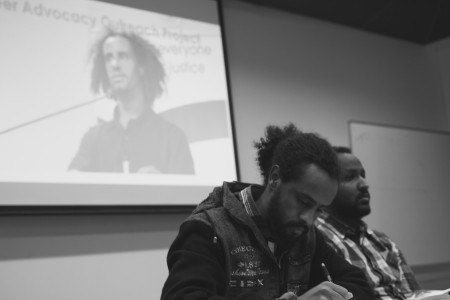 Whilst racial profiling and abuse are often represented as mere tensions between minority communities and individual police members, the problem is in fact much deeper and more dangerous. Racialised policing reflects the attitudes of the State to minority communities in Australia, as in other countries. In fact, the mistreatment by police of racialised, minority communities is seen to exist in every western country. Death at the hands of police is the ultimate and tragic expression of this structural racism. This outcome is extreme, but not the only devastating impact of racist police mistreatment and abuse.
Whilst racial profiling and abuse are often represented as mere tensions between minority communities and individual police members, the problem is in fact much deeper and more dangerous. Racialised policing reflects the attitudes of the State to minority communities in Australia, as in other countries. In fact, the mistreatment by police of racialised, minority communities is seen to exist in every western country. Death at the hands of police is the ultimate and tragic expression of this structural racism. This outcome is extreme, but not the only devastating impact of racist police mistreatment and abuse.
Research has consistently highlighted the problematic nature of relations between police and young people. Interactions between police and young people often breed conflict and tension, with high levels of anger, fear and mistrust on both sides (Crime and Misconduct Commission Queensland, 2009; White, 1997; Liederbach, 2007). As one of our project participants stated:
“I always try to avoid them I don’t look them in the eye. I don’t want to acknowledge them because they don’t do their job properly.” (research participant)
From the perspective of young people, there are perceptions of both over-policing in public spaces and under-policing in cases of victimisation. Perceptions of racism, intimidation and violence have also been identified. Mutually negative perceptions and interactions between police and young people can result in adverse outcomes for both parties. The negative perceptions held by young people may lead to dissatisfaction with police as well as a lack of confidence in the police more generally. Several studies investigating public attitudes towards police support this view and have shown that, in comparison with older people, young people tend to be more dissatisfied with police and have lower assessments of police competency (Crime and Misconduct Commission Queensland, 2009; Borrero, 2001; Brown & Benedict, 2002).
Young people & Police
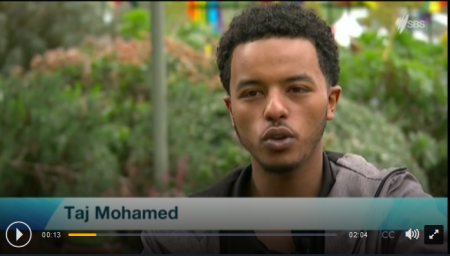 Ten young men were interviewed for this project. One young woman was interviewed to test the questions but it failed to attain the rich stories that we know exist. As young men, we did not feel well positioned to speak to young women about their experiences. We were also very limited in the scope of this project, which was funded for only a three-month period and for which we were employed only part-time. We acknowledge that women’s, including young women’s voices have been largely missing within the academic and community-based research in Victoria about racialised policing. Whilst we were not able to address that gap in this project, we believe it is of great importance that the voices of young women of colour are heard and centred in these conversations and hope to build our support for projects and approaches that enable that.
Ten young men were interviewed for this project. One young woman was interviewed to test the questions but it failed to attain the rich stories that we know exist. As young men, we did not feel well positioned to speak to young women about their experiences. We were also very limited in the scope of this project, which was funded for only a three-month period and for which we were employed only part-time. We acknowledge that women’s, including young women’s voices have been largely missing within the academic and community-based research in Victoria about racialised policing. Whilst we were not able to address that gap in this project, we believe it is of great importance that the voices of young women of colour are heard and centred in these conversations and hope to build our support for projects and approaches that enable that.
Young men we spoke to were selected based on their knowledge and experience of the issues as well as the locality in which they live. We wanted to get the breadth and depth of racialised policing experiences across Melbourne.
Two ‘hotspots’ of racialised policing have been identified through previous research (Dolic 2011; Smith & Reside 2010) as well as the current project. These identified hotspots illustrated in Figure 1 included Melbourne’s inner Western and South Eastern Suburbs and the interviews were divided roughly in half between these two broad areas.
The main suburbs that the interviewees came from were Flemington, Sunshine, Noble park and Dandenong. All young men we spoke to are of refugee background, predominately from the African continent, with various religious beliefs. The participant’s occupations varied – but were limited to blue collar jobs. Some of the young men are also well-respected community leaders.
All of the research participants were from low socio-economic backgrounds. For many young men, speaking with us was the first time that they had shared their personal stories of policing issues with anybody. This was because we had similar experiences and that established a sense of comradery and trust. Young people do not feel comfortable sharing these deeply personal experiences with a “stranger” whom might not believe their story or do anything to help. It is a huge risk for young people to open up and share their stories with service providers. That risk for many is not worth taking as service providers do not seem to know what to do when it is the police that are misbehaving.
Young people’s experiences of policing.
Coming in to this project with experiences of racialised policing and a community battle for justice, we thought that we understood the issue and the extent to which brutality is normalised. We were shocked at the extent to which these views were entrenched. Experiences of racialised policing were spoken about as if they were a daily routine that for some was as common as being asked to pay for goods at a store.
Why do young people feel they are treated differently due to their race, perceived race or ethnicity?
- Disproportionate level of stops and searches (Gordon 2012).
- How they see others being treated by police – this tends to be more polite, whereas the questioning of black young men feels more like an interrogation. This feels like the police are just waiting for young people to crack and confess.
- Under-policing: when people of colour report crimes or seek assistance, they are either not taken seriously or told their matter is not urgent/important.
‘Over-policing’
Interviewing the young people we found that their police encounters were mainly in public spaces whilst they were doing everyday activities such as catching public transport, walking in public or driving. The approach of police officers during these encounters was described as being threatening in nature and held an underlying assumption of guilt.
This sometimes resulted in young people being unlawfully assaulted or embarrassed in public through unnecessary searches or questioning. The young people expressed their frustration at the continuous harassment and assumption of guilt during their policing encounters. These assumptions lead to young men reporting weekly contact with the police. Some expressed the embarrassment they are put through when stopped and searched publicly. For others, it is the way police framed questions targeting them that made them feel like they are being publicly interrogated, as this is done before the public using a series of interrogative questions.
It was a common feeling within young African men that this would not happen with their peers from Anglo backgrounds, that those peers don’t experience the same level of attention in public spaces as they are not seen as threat to society. These young men also observed that even when those peers are in contact with police, the same assumptions of guilt are not made. These claims echo a report by the Crime and Misconduct Commission Queensland (2009) which suggests that ethnic young men are more likely to experience negative police contact because they are more visible and therefore are perceived as being more of a threat to society.
When police approach those of Anglo backgrounds, they genuinely ask questions related to policing – that is, the questions are open ended – which allows space for an explanation. Young black men reported heavy handed policing whilst they were doing mundane activities such as walking down a busy street or catching public transport As one of our research participants put forward:
“I would be stopped [and] asked what I was doing and [where] I was going for nothing. Sometimes they call you names when they feel like it.”
One of the research participants shares an encounter he had with police. He tells us that one evening, while walking to find a taxi to go home, he was stopped by two police officers who asked where he was going and what he was doing there.
“I told them I was going home then they asked me for ID” he adds. At which point he said he didn’t have any ID but stated that he only has a healthcare card.
As he reached into his pocket for his healthcare card, he was hit to the ground by police.
“I don’t remember what happened after that, but when I woke up I just saw blood and that one of my front teeth had been knocked out”.
This young man says what is happening here is a lack of care by those who are meant to be our protectors.
‘Under policing’
Examples of under policing are common not only amongst young men but the CALD community in general. They range from police refusing to respond adequately to community concerns to refusing to investigate and apprehend offenders. Members of the community have also reported being asked their ethnicity when making an emergency call and have experienced slower responses to their enquiries when the officer has identified their ethnic background.
Other stories captured by this project include a mother who had to attend the police station 3 times and have the presence of her community leaders for a police officer to place a missing persons report for her teenage son whom a week later was found dead by police. Instead of attending the family house to deliver the tragic news to his mother, an officer called her into the police station – which is not the general practice.
SNAPSHOT: A summary of the responses of young people to our questions
- Have you or anyone you know had much contact with police?
A majority of young people had experienced racial profiling and the few who hadn’t had a story of someone they know to tell.
- How often do you have contact with police?
Half experienced it on a weekly basis. Most felt like they were being picked on. They stopped activities like going out to town to avoid police contact. The interactions varied in severity, some have had minimal contact but it had been a traumatic experience.
- Can you describe the type of contact with police? Is it normal/usual?
The way police approach young black males is intimidating and begins in a negative confrontation. They provoke young people in order to have their way by using racial slurs or threatening language or physical assault. In all the contacts the location was in public spaces. There was one person who said that he has had some good experiences. Both examples of under and over policing were reported by young people.
- Why do you think you are policed like this?
Because we are different and police are biased. Power tripping simply because they can and they know that they can get away with it because young people don’t have as much power.
- Who have you told about it?
Majority said “nobody”. The few who said yes said the contacted friends and legal firms. There was only one person who succeeded in getting support and that was through FKCLC.
- What have you done/what can you do?
Majority said they can’t do anything about it due to financial challenges. The few who contacted legal aid said they would be able to support them because they are not on their priority list.
- Why haven’t you done anything about it?
Lack of legal support and faith in the legal system to deliver justice for them. The fear of police retribution.
- How does the contact with police make you feel?
Weak, unwelcome in Australia, unworthy, insecure, not having the right to use public space.
- How do you stay safe?
Avoidance is the main strategy but this has many social impacts on young people’s lives and may lead to social isolation as they avoid going to clubs and other social scenes. Other strategies include being in big groups.
- Who is supporting you about this? Community/family/agencies?
Most young people feel like they have nobody to go to if they have police issues.
- How important is this issue to you? In terms of other issues in your life?
For majority it is important but because of the hopelessness it’s not on the priorities list in young people’s lives. In one case it was the most important thing as they believed the whole country was founded on white supremacy.
- How hopeful do you feel about changing these issues for yourself or others? Why?
Some are hopeful because they are seeing this issue in the media and that it will change for generations to come. Others are not hopeful.
- What are your ideas for change?
Anti-racism education and training for both the general community and law enforcement agencies. Some also say we need a police force that reflects Victoria’s multicultural society.
- How likely are you to complain?
Majority say that they might complain and the rest are evenly split between not complaining and definitely complaining.
The Impacts of Racialised Policing
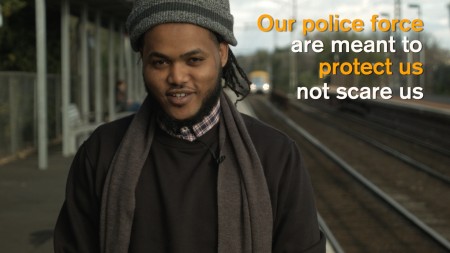 The impact of negative policing experiences on young people is profound. Developmentally they are at a stage where they are looking for their place in society; possibly rebelling against the values instilled in them by their parents and are heavily influenced by their peers and the media. In some ways it is also the most vulnerable stage in their life as they are most exposed to the world’s influences through popular culture and other mechanisms.
The impact of negative policing experiences on young people is profound. Developmentally they are at a stage where they are looking for their place in society; possibly rebelling against the values instilled in them by their parents and are heavily influenced by their peers and the media. In some ways it is also the most vulnerable stage in their life as they are most exposed to the world’s influences through popular culture and other mechanisms.
The main stereotypical black male narratives that young men are continuously exposed to are associated with criminality and gangs. When one is continually treated as such they may unconsciously begin to accept that stereotype as their destiny and reality. Combine this with a lack of positive mentors and growing up in public housing where you have greater access to drugs and dealers than you do to books and professionals. The system has set up these young boys & men for a life associated with crime and dependency – it is amazing that so many young men of colour resist or avoid that kind of life.
There are strong and consistent relationships between racial discrimination and a range of detrimental health outcomes such as low self-esteem, reduced resilience, increased behaviour problems and lower levels of wellbeing. (Priest et al, 2013)
The police’s abuse of their power pushes young men further on to the margins of society where the young men feel a reduced sense of belonging, suffer mental health issues and a longing for a place where they are valued. This creates a world of vulnerability and social isolation.
“…everybody that saw what was happening just kept walking past because racism is not their business. Even though it should be everybody’s business.” (research participant)
Research shows a strong causative connection between racism and depression, anxiety and behavioural problems. Racism comes first and the effects come afterwards. (Paradies, 2013)
For more information and for copies of the full report see here.
Please add your voice to the urgent call for a racial profiling monitoring scheme in Victoria to prevent police targeting people based on race.


